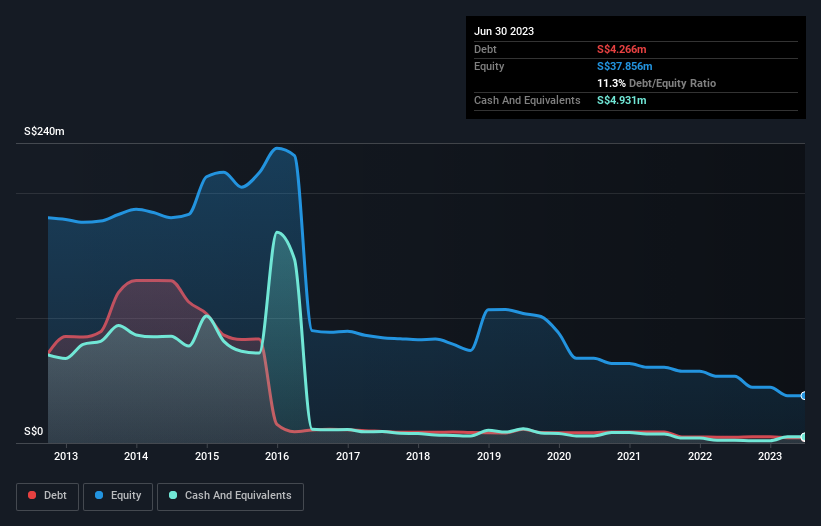The external fund manager backed by Berkshire Hathaway's Charlie Munger, Li Lu, makes no bones about it when he says 'The biggest investment risk is not the volatility of prices, but whether you will suffer a permanent loss of capital.' It's only natural to consider a company's balance sheet when you examine how risky it is, since debt is often involved when a business collapses. We can see that IPC Corporation Ltd (SGX:AZA) does use debt in its business. But the more important question is: how much risk is that debt creating?
When Is Debt Dangerous?
Debt is a tool to help businesses grow, but if a business is incapable of paying off its lenders, then it exists at their mercy. In the worst case scenario, a company can go bankrupt if it cannot pay its creditors. While that is not too common, we often do see indebted companies permanently diluting shareholders because lenders force them to raise capital at a distressed price. Of course, debt can be an important tool in businesses, particularly capital heavy businesses. When we think about a company's use of debt, we first look at cash and debt together.
Check out our latest analysis for IPC
What Is IPC's Debt?
You can click the graphic below for the historical numbers, but it shows that IPC had S$4.27m of debt in June 2023, down from S$4.68m, one year before. But it also has S$4.93m in cash to offset that, meaning it has S$665.0k net cash.

How Healthy Is IPC's Balance Sheet?
Zooming in on the latest balance sheet data, we can see that IPC had liabilities of S$10.3m due within 12 months and liabilities of S$1.09m due beyond that. On the other hand, it had cash of S$4.93m and S$477.0k worth of receivables due within a year. So its liabilities outweigh the sum of its cash and (near-term) receivables by S$6.03m.
This deficit isn't so bad because IPC is worth S$11.1m, and thus could probably raise enough capital to shore up its balance sheet, if the need arose. But we definitely want to keep our eyes open to indications that its debt is bringing too much risk. Despite its noteworthy liabilities, IPC boasts net cash, so it's fair to say it does not have a heavy debt load! The balance sheet is clearly the area to focus on when you are analysing debt. But you can't view debt in total isolation; since IPC will need earnings to service that debt. So if you're keen to discover more about its earnings, it might be worth checking out this graph of its long term earnings trend.
In the last year IPC had a loss before interest and tax, and actually shrunk its revenue by 38%, to S$2.3m. To be frank that doesn't bode well.
So How Risky Is IPC?
While IPC lost money on an earnings before interest and tax (EBIT) level, it actually generated positive free cash flow S$3.1m. So taking that on face value, and considering the net cash situation, we don't think that the stock is too risky in the near term. Until we see some positive EBIT, we're a bit cautious of the stock, not least because of the rather modest revenue growth. The balance sheet is clearly the area to focus on when you are analysing debt. However, not all investment risk resides within the balance sheet - far from it. For example IPC has 4 warning signs (and 3 which are concerning) we think you should know about.
If, after all that, you're more interested in a fast growing company with a rock-solid balance sheet, then check out our list of net cash growth stocks without delay.
New: AI Stock Screener & Alerts
Our new AI Stock Screener scans the market every day to uncover opportunities.
• Dividend Powerhouses (3%+ Yield)
• Undervalued Small Caps with Insider Buying
• High growth Tech and AI Companies
Or build your own from over 50 metrics.
Have feedback on this article? Concerned about the content? Get in touch with us directly. Alternatively, email editorial-team (at) simplywallst.com.
This article by Simply Wall St is general in nature. We provide commentary based on historical data and analyst forecasts only using an unbiased methodology and our articles are not intended to be financial advice. It does not constitute a recommendation to buy or sell any stock, and does not take account of your objectives, or your financial situation. We aim to bring you long-term focused analysis driven by fundamental data. Note that our analysis may not factor in the latest price-sensitive company announcements or qualitative material. Simply Wall St has no position in any stocks mentioned.
About SGX:AZA
IPC
An investment holding company, engages in property development and investment activities in Singapore, Japan, and China.
Slight risk with mediocre balance sheet.
Market Insights
Community Narratives



